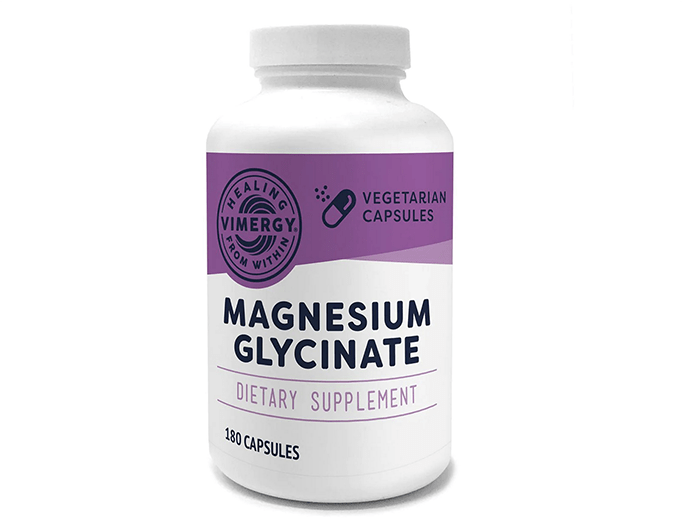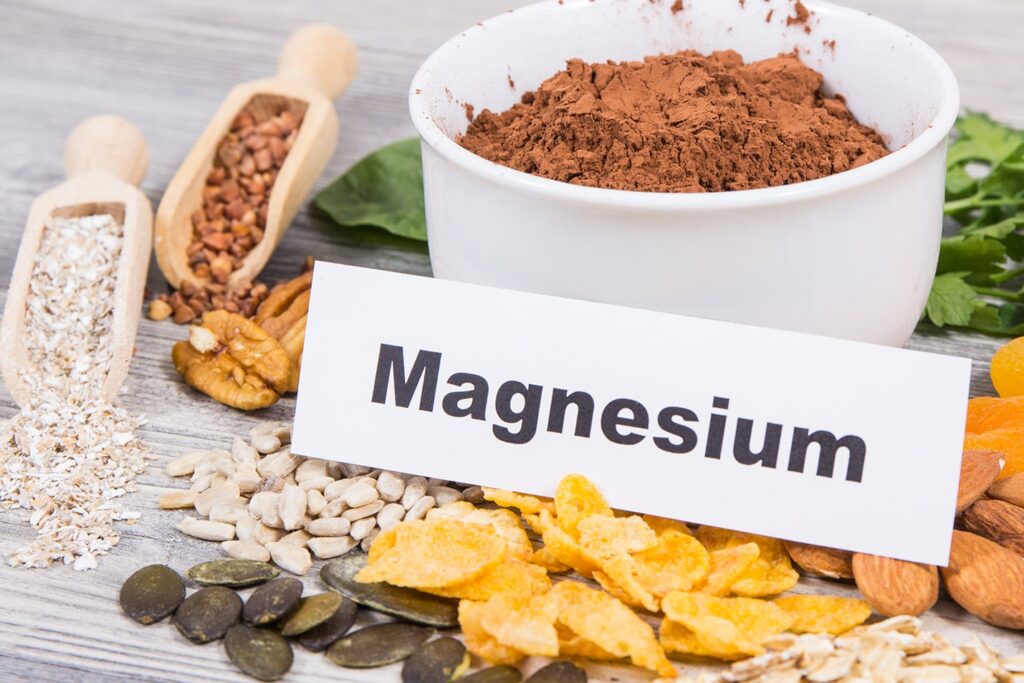In our quest for optimal health and vitality, we often overlook the importance of one vital mineral that’s possibly the most important mineral in the world – magnesium. This article will shed light on the role magnesium plays in our bodies, the potential dangers of a deficiency, and the remarkable benefits it offers to our well-being. From our heart health, bone structure, and muscle function to its significant impact on our brain health, sleep patterns, and stress management, the importance of magnesium is profound.

What is Magnesium
Magnesium is an essential mineral that plays a crucial role in many body processes, including muscle and nerve function, regulating blood pressure, and supporting the immune system[1][2][3].Magnesium is involved in over 300 enzyme reactions in the human body[3]. It is also a component of bone, with 60% of the body’s magnesium stored in bone[2]. Magnesium is important for many processes in the body, including regulating muscle and nerve function, blood sugar levels, and blood pressure, and making protein, bone, and DNA[4].

Magnesium Deficiency: The Silent Global Epidemic
It’s alarming to note that magnesium deficiency is not merely a regional issue, but a global epidemic. In fact, it’s estimated that half of the heart attacks worldwide could potentially be linked to low magnesium levels.
A recent study in the Atherosclerosis journal revealed that for over a decade, individuals with lower magnesium levels experienced twice the mortality rate from heart-related issues compared to those with higher levels[5]. It is estimated that over 70% of adults are deficient in this critical mineral, which is a key player in more than 600 important metabolic reactions in our bodies. Each of your body’s cells houses and requires magnesium.[8]
Moreover, a Harvard study showed a striking 77% reduced risk of sudden cardiac death in women who had the highest magnesium levels compared to those with the lowest levels[6].
The intention isn’t to alarm you with these statistics but rather to increase your awareness about the gravity of the situation. The upside is that the solution to the problem is straightforward: proper magnesium supplementation can have transformative effects on your health.
Without magnesium, your cells would struggle to produce energy, your nerves and muscles (including your heart) would malfunction, and your blood vessels and arteries would progressively harden. Magnesium deficiency also impacts brain health, hindering brain function and potentially contributing to neurological disorders. It affects the permeability of the blood-brain barrier, which could lead to brain inflammation and impact brain cells, influencing brain plasticity.

A low level of magnesium can manifest with issues constipation, leg cramping, muscle cramping, joint pain, and high blood pressure. It’s crucial to understand that no one is exempt from the need for magnesium. There’s nobody in the world that can confidently say they’re fully stocked up on this essential mineral. Please also note that low magnesium levels don’t usually cause alarming symptoms [7] so it’s best to just take it every day, this way you’ll avoid being deficient all together.

Magnesium: The King of Minerals
Magnesium is essential for your body to absorb and utilize other supplements effectively. If you’re lacking in magnesium, other supplements won’t bind as well. It’s like a key that unlocks the body’s ability to benefit from vitamins B and D.

Magnesium-Rich Foods
Here are some of the most magnesium-rich foods you can include in your meals:
Green Leafy Vegetables: These are excellent sources of magnesium. Spinach and swiss chard, for instance, provide a hefty portion of your daily requirement.
Nuts and Seeds: Almonds, cashews, and peanuts are all high in magnesium. Pumpkin, sesame, and flax seeds also contain considerable amounts of this mineral.
Whole Grains: Whole grains such as quinoa, brown rice, and whole wheat are rich in magnesium. Whole grain bread and cereals can also be good sources.
Legumes: Foods such as black beans, kidney beans, chickpeas, and lentils are packed with magnesium.
Avocados: Apart from being a great source of healthy fats, avocados are also rich in magnesium.
Bananas: While they’re famous for their potassium content, bananas also provide a good amount of magnesium.
Dark Chocolate: Not only is it delicious, but dark chocolate also contains high levels of magnesium.
Fish: Fish like mackerel, wild salmon, and halibut have substantial amounts of magnesium.
Baked Potatoes: Potatoes, especially the skin, are high in many nutrients, including magnesium.
Yogurt and Kefir: These dairy products are not only good sources of calcium and probiotics, but they also contain magnesium.

The Soil Crisis
Unfortunately, today’s soils are not what they used to be. The nutritional value of the soil our food is grown in has deteriorated over the years. Few farmers still practice sustainable farming methods and modern agricultural practices, unlike sustainable farming methods, often lead to the depletion of essential nutrients in the soil. This inevitably leads to a decline in the magnesium content of the foods that are grown in such soils.

Magnesium Supplementation: Necessity over Choice
The stark reality is that we need to supplement our dietary magnesium intake. Since our food supply is insufficient, it’s crucial to find reliable magnesium supplements to bridge the gap.
The benefits of magnesium go far beyond just heart and brain health. This mineral serves as a multifaceted powerhouse within our bodies. From regulating blood pressure and blood sugar levels to influencing our response to stress hormones, magnesium plays a critical role.
Magnesium is known to induce calm, thereby alleviating anxiety and stress, and is often a go-to form of natural vitality for individuals with anxiety-related disorders. The scientific evidence supports the use of magnesium for anxiety, with supplements like magnesium citrate and magnesium taurate shown to reduce subjective anxiety. It’s also essential for promoting regular bowel movements, preventing constipation, and combating premenstrual syndrome symptoms.
In essence, supplementing magnesium is not just a matter of choice, but a necessity. The decision shouldn’t be whether or not to supplement, but rather, which form of magnesium supplement is best suited to individual health needs and the specific conditions to address.

The Ionic Advantage
The best form of magnesium supplementation for me has been the ionic one as I’ve been gradually shifting most of my supplements to liquid form since they’re easier to digest. I particularly favor the ionic tonic by Zuma Nutrition. But I still take a powdered form, Magnesium Glycinate, which I find easy on my system.

Magnesium Glycinate
Magnesium Glycinate is known for its high bio availability and digestibility, it also aids in gut health, delivering vital minerals to where they’re most needed.
It’s also the ideal choice for individuals with sensitive digestive systems. This means that while delivering the numerous benefits of magnesium, it doesn’t compromise gut comfort, underlining its superior nature as a supplement. Thus, in the quest for optimal health and magnesium sufficiency, Magnesium Glycinate is a great solution.
Another highly recommended form of magnesium is Liposomal Magnesium by Cymbiotika. This innovative formulation utilizes a gel-like substance, providing an easy and convenient method of consumption. You simply tear open the provided package and squeeze the product directly into your mouth.

My Health Journey: From Fatigue to Superpowers
In my early 30’s, I used to crash around noon, needing naps despite believing I was quite healthy. Now, I’m realizing that I wasn’t as healthy as I thought. I was deficient in many nutrients and amino acids, which took a toll on my energy levels. Supplementing with magnesium has been a game changer.
After introducing magnesium into my daily routine I feel more energetic, more vibrant, and healthier. It’s like I’ve been given superpowers. I’m no longer crashing at noon, I feel like a superhuman!
I usually take ionic magnesium in liquid form during the day, simply adding it to my water along with a few other supplements. I also have it in powder form at night before going to bed. I stir it into warm water and take it with 15mg of melatonin. This combination ensures amazing deep sleep and is wonderful for any type of stress or anxiety.

The Beneficial Effects on Children: My Personal Observation
Magnesium supplementation isn’t just for adults. I also give magnesium to my daughter in the form of gummies. I’ve observed that when she’s regularly taking her magnesium supplement, she’s calmer, less irritable, and her digestion seems to be in better shape. Everyone, regardless of age, should be taking magnesium.

Doctors Don’t Always Test for Magnesium Levels
You may wonder why, given the importance of magnesium, doctors don’t often test for it. The answer lies in the fact that magnesium resides predominantly in our bones, muscles, and soft tissues. making it difficult to measure accurately through standard blood tests.
Because of this, deficiencies might not be detected until they become severe, making proactive magnesium testing a critical consideration for preventive health care.
Additionally, the medical community’s focus is typically on acute health conditions and evident disease states. Consequently, the role of nutrition and minerals such as magnesium, crucial as they are to overall well-being, is often undervalued in mainstream medicine.

The Importance of Regular Testing
Even though it might sound like a lot of work, it’s crucial to know what your body needs. I get tested every six months for mineral deficiencies and vitamins. Sometimes, I stop taking a particular supplement if the tests show perfect levels, only to find a deficiency six months later. It goes to show that our bodies are dynamic systems, constantly changing and adapting to different conditions.
Supplementing is not a static process but rather an evolving journey of understanding your body’s nutritional needs. Regular testing serves as a guide, ensuring that you are supplying your body with the right nutrients in the right amounts. It’s a proactive approach to health, fostering a balance between prevention and treatment.

Blood Brain Barrier and Magnesium
The role of magnesium in brain health is as crucial as it is fascinating. As a central component in neurotransmitter regulation, magnesium influences the transmission of messages throughout the brain and body, impacting everything from mood to memory.
Certain forms of magnesium, notably magnesium threonate, have the unique ability to cross the blood-brain barrier — a highly selective semipermeable border that separates the circulating blood from the brain and extracellular fluid in the central nervous system. By crossing this barrier, magnesium threonate can directly benefit brain cells, fostering improved cognitive function and brain plasticity.
Brain plasticity, or neuroplasticity, refers to the brain’s ability to reorganize itself by forming new neural connections throughout life. Magnesium’s role in this process potentially supports learning, memory, and overall cognitive function. Additionally, evidence suggests that magnesium may help mitigate the impact of stress hormones on the brain, providing a potential avenue for addressing anxiety and stress-related disorders. In summary, the intricate relationship between magnesium and brain health underscores the mineral’s fundamental role in neurological well-being.

The Anxiety-Reducing Effects of Magnesium
When it comes to managing anxiety and stress, magnesium has shown promising results. Research has found a significant reduction in anxiety symptoms with magnesium supplementation. It seems to reduce subjective anxiety and may even be beneficial for people with generalized anxiety disorder.
Magnesium is often paired with other supplements, like amino acids, in many natural formulations aimed at reducing anxiety and stress. This is a testament to the versatility and potent therapeutic potential of magnesium, reinforcing its status as an indispensable mineral for mental health.

Magnesium for Cardiovascular Health
The health benefits of maintaining adequate magnesium levels extend to cardiovascular health as well. A heart-healthy diet often highlights the importance of magnesium-rich foods, and for good reason. Emerging scientific evidence links increased dietary magnesium intake to a reduced risk of cardiovascular disease, including conditions such as high blood pressure and heart disease.
One of the most notable roles of magnesium in cardiovascular health lies in its ability to regulate blood pressure. Magnesium aids in the relaxation and dilation of blood vessels, which can contribute to lower blood pressure levels. This is a critical function considering that high blood pressure, or hypertension, is a significant risk factor for several cardiovascular diseases.
Furthermore, magnesium also impacts lipid metabolism and inflammation, both of which play a role in the development of atherosclerosis, a condition that can lead to heart attacks. The multi-faceted contribution of magnesium to cardiovascular health underscores its significance and makes a compelling case for maintaining healthy magnesium levels in the body.

Magnesium and Premenstrual Syndrome (PMS)
Another area where magnesium supplementation has been found to be particularly beneficial is in the management of premenstrual syndrome (PMS). PMS is characterized by a range of physical and psychological symptoms that occur in the days before menstruation.
Studies have shown that supplementing with magnesium can help alleviate some of these symptoms. It has been found to reduce water retention and bloating, mood swings, and breast tenderness. Some women have also reported that magnesium supplementation helps to lessen menstrual cramping.

Magnesium: A Sleep Aid
Magnesium plays a pivotal role in regulating our sleep cycles. By facilitating the calming of the nervous system, magnesium helps prepare the body for sleep. Its role in nerve function extends to the mitigation of nighttime muscle cramps, a common sleep disturbance. People experiencing insomnia, a disorder characterized by difficulty falling or staying asleep, often have low magnesium levels, highlighting a possible link between magnesium deficiency and poor sleep quality.
Regular supplementation with magnesium has been reported to improve sleep quality. People using magnesium supplements often report deeper, more restful sleep, and an easier time falling asleep. These benefits, combined with its lack of addictive properties and minimal side effects, make magnesium a potential natural alternative to synthetic sleep aids.

Magnesium and Bone Health
Magnesium is essential for bone health. It is involved in bone formation and influences the activity of osteoblasts and osteoclasts, cells responsible for the formation and destruction of bone tissue, respectively. Moreover, it impacts the concentration of both parathyroid hormone, which regulates calcium homeostasis, and vitamin D, a nutrient important for maintaining healthy bones.
Adequate magnesium intake is linked with higher bone mineral density, which is a measure of bone health and strength. Lower bone mineral density can increase the risk of osteoporosis, a condition characterized by fragile and porous bones. Studies suggest that consistent magnesium intake may reduce the risk of osteoporosis, further emphasizing magnesium’s significance for bone health.

Magnesium and Muscle Function
A deficiency in magnesium can cause muscle weakness and spasms, underlining the importance of maintaining healthy magnesium levels for optimal muscle health. Those engaged in high-intensity physical activities or sports may particularly benefit from magnesium supplementation due to its role in muscle recovery and function. Magnesium can help reduce lactic acid build-up, which often causes post-exercise pain and discomfort.
Moreover, magnesium helps transport other minerals like potassium and calcium, which are also vital for muscle function, across cell membranes. This function enhances nerve signaling and muscle contraction, which are fundamental for various physical activities. Hence, maintaining adequate magnesium intake is an integral part of promoting healthy muscle function and overall physical performance.

A Vital Mineral for Body and Mind
Without a doubt, magnesium is a remarkable mineral, offering countless benefits to both our physical and mental health. Let me tell you, as someone who has been supplementing with magnesium for years, I can vouch for its profound impacts on well-being. However, many of us are simply not getting enough magnesium intake from our diet.
Like I mentioned above, this lack of adequate magnesium is not simply due to a change in our dietary habits but the state of the very soil our food is grown in. Thus, there’s a growing need for magnesium supplements to address this deficiency and maintain healthy magnesium levels.

How Much Magnesium Should You Take?
Many individuals wonder “how much magnesium” should one intake daily? Can one have excess magnesium? According to the European Food Safety Authority, consuming more than 250mg of supplemental magnesium per day, in addition to your regular dietary intake, may lead to diarrhea and stomach cramps. Therefore, it’s crucial to be aware of your magnesium intake levels to avoid potential side effects.
Ultimately, maintaining optimal magnesium levels is a pivotal part of our overall health. Whether through magnesium-rich foods, magnesium supplements(please follow direction the packaging- too much magnesium can lead to magnesium toxicity), or a combination of both, getting enough magnesium should be a health priority for everyone.

Choosing the Right Form of Magnesium: It's Not One-Size-Fits-All
There are many forms of magnesium supplements available in the market, including magnesium oxide, magnesium sulfate, magnesium carbonate, magnesium lactate, and more. Each form of magnesium has its own set of benefits and bioavailability. It’s crucial to choose the right one that suits your specific health needs and conditions.
Choosing the right form of magnesium is crucial. While I prefer Magnesium Glycinate, the reality is that everyone’s body is unique, and what works best for me may not work as well for you. It’s all about finding the type of magnesium that suits your body the best.
The array of available magnesium supplements — from magnesium citrate, magnesium oxide, and magnesium chloride to more specialized forms like magnesium taurate, magnesium malate, and magnesium threonate — offers various benefits. The choice of form largely depends on the specific health concerns you’re addressing. For instance, magnesium citrate is often recommended for its laxative properties, while magnesium malate may be beneficial for people dealing with fatigue.
The key takeaway is that magnesium supplementation isn’t a one-size-fits-all solution. It’s an individualized process, hinging on understanding your body’s unique needs, tolerances, and responses. Regular testing, combined with professional guidance, can provide valuable insights to help you make an informed choice.
I love & recommend these below:
Best overall: Life Extension Magnesium Caps
Best magnesium powder: Thorne Magnesium Bisglycinate Powder
Best for sleep: Nested Magnesium Glycinate
Best for anxiety: Klaire Labs Magnesium Glycinate Complex
Best for leg cramps: MegaFood Magnesium
Best for migraine: Douglas Laboratories Magnesium Oxide
Best for magnesium deficiencies: Trace Minerals Mega-Mag
Best for constipation: Pure Encapsulations Magnesium Citrate, Pure Encapsulations Magnesium Liquid

Coaching Sessions
I am currently offering one-on-one coaching sessions to help individuals who may be facing challenges in achieving their goals independently. My goal as a coach is to guide and support you in every step of your journey, while also holding you accountable for the actions you take towards achieving your desired outcomes.
Whether you want to improve your health and wellness, establish better habits, or achieve personal and professional growth, I can provide you with personalized attention, a customized approach that suits your unique needs, and the necessary tools and motivation to help you reach your full potential and transform your life.

Conclusion
In conclusion, magnesium is a vital nutrient that plays numerous roles in our bodies. From promoting good mental health to supporting bone health and muscle function, the benefits of magnesium are extensive. It’s important to ensure you are getting enough magnesium, whether through diet or supplementation. Regular testing can help you keep track of your magnesium levels and address any deficiencies before they lead to health problems.
Please remember, it’s always recommended to consult with a healthcare provider before starting any new supplement regimen, including magnesium. Your healthcare provider can give you personalized advice based on your individual health needs and conditions.
Conclusion
Magnesium is an essential mineral that plays a crucial role in various body processes, including muscle and nerve function, regulating blood pressure, and supporting the immune system.
Magnesium is involved in over 300 enzyme reactions in the human body.
A deficiency in magnesium can lead to severe health issues, including cardiovascular disease and neurological disorders.
Studies have shown that low magnesium levels are associated with a higher risk of heart-related issues and increased mortality rates.
Green leafy vegetables, nuts and seeds, whole grains, legumes, avocados, bananas, dark chocolate, fish, baked potatoes, yogurt, and kefir are all good sources of magnesium.
Estimates suggest that over 70% of adults are deficient in magnesium, and the nutritional value of the soil has declined, leading to a decrease in magnesium content in foods. Supplementation is necessary to bridge this gap and ensure sufficient magnesium intake.
Magnesium supplementation can support heart health, bone strength, brain function, stress management, anxiety reduction, regular bowel movements, and aid in combating premenstrual syndrome symptoms.
Liquid supplements, such as ionic magnesium, are easier for the body to absorb and have increased bioavailability. They offer convenience and adaptability to one's routine. Ionic magnesium is specifically mentioned as a favorable form.
Magnesium Glycinate is a form of magnesium known for its high bioavailability, digestibility, and gut health benefits. It is well-tolerated and suitable for individuals with sensitive digestive systems.
Liposomal magnesium is mentioned as another form that offers unique benefits and easy consumption. It is described as a gel-like substance that can be squeezed directly into the mouth.
Magnesium testing presents challenges due to its distribution in the body, predominantly in bones and muscles. Standard blood tests often do not accurately reflect total body magnesium content. Additionally, the focus of mainstream medicine tends to be on acute health conditions, and nutrition and minerals like magnesium may be undervalued.
No, choosing the right form of magnesium supplementation is important, and it may vary based on individual needs and responses. Different forms of magnesium, such as magnesium citrate, magnesium oxide, and specialized forms like magnesium threonate and magnesium malate, offer distinct benefits.
Certain forms of magnesium, such as magnesium threonate, have the ability to cross the blood-brain barrier. This allows for potential direct benefits to brain cells, improving cognitive function and brain plasticity.
Magnesium offers numerous benefits to both physical and mental health, including improved cardiovascular health, bone strength, brain function, stress reduction, and anxiety relief. Magnesium supplementation is necessary due to inadequate dietary intake and declining magnesium content in soil.

Resources
1. Magnesium Supplements: Benefits, Deficiency, Dosage, Effects, and More – WebMD
2. Magnesium | The Nutrition Source | Harvard T.H. Chan School of Public Health
3. Magnesium: Health benefits, deficiency, sources, and risks – Medical News Today
4. Magnesium – Consumer – NIH Office of Dietary Supplements
5. Low serum magnesium concentrations predict cardiovascular and all-cause mortality
6. Plasma and dietary magnesium and risk of sudden cardiac death in women
7. Pros and cons of taking a magnesium supplement – Mayo Clinic

With a positive approach and a motivation mindset, you will reach your health goals, no matter how hard they may seem at first. Learn more about my one-on-one coaching program here.







